Tim C. Taylor's Blog, page 19
November 3, 2011
I'm interviewed by Robyn Porter
In which I talk about Last Man Through the Gate, my approach to writing, and the big scary ideas that lurk in the background, connecting much of my fiction.
And Lego.
You can see the interview here .
.








Epic poetry, Twitter avatars, and xhtml1.1
 Would you believe, I published an illustrated book of YA poetry this week? That wasn't the plan when I set up Greyhart Press, but I'm really excited about it. So much so that I had to design a YA badge. Look… here it is now!
Would you believe, I published an illustrated book of YA poetry this week? That wasn't the plan when I set up Greyhart Press, but I'm really excited about it. So much so that I had to design a YA badge. Look… here it is now!
Expect a blog post on why I published Legends of Light any day now.
 Also on the cards is a fresh coat of paint for this blog and my Twitter avatar. I like my yellow man whirring his gears being oppressed by cave art. It was the best bit of cover art I had designed at the time. Doesn't work well as an avatar, though. So I'm going to rejig to fit with something that does work at avatar level…
Also on the cards is a fresh coat of paint for this blog and my Twitter avatar. I like my yellow man whirring his gears being oppressed by cave art. It was the best bit of cover art I had designed at the time. Doesn't work well as an avatar, though. So I'm going to rejig to fit with something that does work at avatar level…
As for coding, xhtml1.1 is what we use to code books in the ePUB2 format (which these days everything uses other than Kindle… I miss Microsoft .lit). I've got a rudimentary page on my site where I advertise my eBook formatting services. Probably in December I'll spruce that up so I can show off all the fancy authors and book publishers I've already produced books for. If you're interested in contacting me, take a look at my page here.








October 27, 2011
I'm interviewed by Lynn Hubbard
Harry Potter, The Lord of the Rings, JK Rowling, steampunk, and the First World War. Expecto Patronus. Sounds like a grubby attempt to squash SEO keywords into a blog post. Actually, I was interviewed yesterday about my new novella Last Man Through the Gate, and these were some of the things that came up.
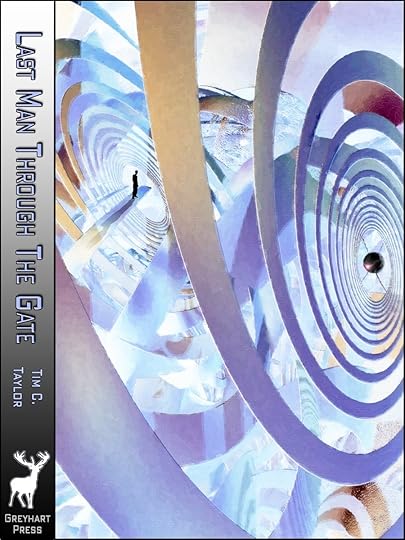 I interviewed Lynn last week and we enjoyed it so much that we thought we'd try it the other way around.
I interviewed Lynn last week and we enjoyed it so much that we thought we'd try it the other way around.
Why not find out for yourself by following this link. (And don't worry, I don't get my shirt off, unlike the men on a lot of Lynn's books)

 [image error]
[image error]
[image error]
[image error]




October 21, 2011
Guest Interview: Lynn Hubbard and the similarities between historical and science fiction
This week I'm interviewing author Lynn Hubbard. So, first off, thanks, Lynn, for agreeing to this email interview. Lynn, although we write in different genres, I'm going to hazard a guess that you're like me in wanting to write the kind of stories that we like to read. Part of that, for me, means setting them in worlds very different to contemporary life. Most of your novels are historical romances; they might not be fantasy or science fiction, but they are certainly not set in the contemporary world. Chase the Moon and Run into the Wind are both set in 1880s Mississippi, while Return to Love takes place in 1950s Ohio. I'd like to kick off by first asking what motivated you to use a historical setting, and why these ones specifically.
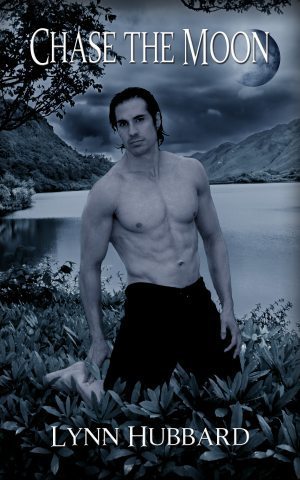 This country is full of history! It is much more exciting to imagine you are on the plains with wind blowing through your hair and the sweet smell of prairie grass under your feet. Most readers I know, read to escape the city, the subway, rush hour. They want to go back to simpler times. And it is my job to take them there.
This country is full of history! It is much more exciting to imagine you are on the plains with wind blowing through your hair and the sweet smell of prairie grass under your feet. Most readers I know, read to escape the city, the subway, rush hour. They want to go back to simpler times. And it is my job to take them there.
I agree that there is so much history there; we're just too busy to notice it. If we wind the clock back, say, 125 years, and swap the city for the prairie, I would agree that life would be simpler. Certainly life's challenges would be less confusing. But would life then be harder? And if life was simple, but not easy, does that lend itself to more compelling stories?
You are not only challenged by developing realistic characters and settings, but also being realistic. In the 1800′s if you lived to be in your fifties you were very lucky. Not only was there a high infant mortality rate, but disease, war, plagues etc.
Yes, life was more difficult but maybe a bit more rewarding? To work hard and be rewarded by your own accomplishments. There was no one else to depend on back then. If you were able, you worked hard 'til you died. If you weren't able, then you didn't make it. But KNOWING that you may not live thru the winter, makes you rethink what is important in your life.
That's an interesting perspective. You make it sound as if your characters are at war, fighting the brutal challenges that confront them. Major wars seem to prompt a rash of marriages… and babies. Harking back to a simpler yet harder life… is that why you chose to set your romances in a historical period? Is that why the historical romance is such a popular genre?
I love history, and I like to entwine in into my book if possible. Run into the Wind and Chase take place after the civil war. The war has been over for years but it still affects their then as well as our lives now. Not only did it unify the country, but it also propelled the study of medicine forward by leaps and bounds.
Romance books are popular because they are ROMANTIC. And it's not all about the sex. Again it is all about escapism. I only have males on my covers for a reason. Women want to imagine themselves in the picture or build a picture in the mind of what the character looks like. That is why so many people who see a movie made from a book are disappointed. Because the characters do not match what they had always imagined them to be.
When I write, I try to capture all of the emotions my characters are feeling and portray them to the reader. I recently had a wonderful review where my fan was angry at me because I made her cry. I was touched that my writing could awaken such emotions.
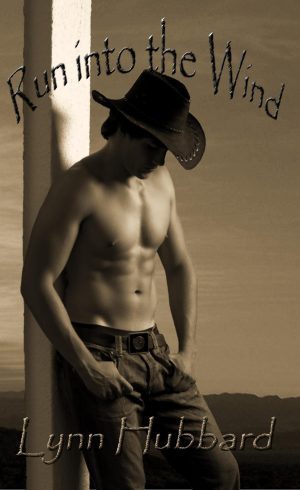 How did you approach researching your history? One of the hardest parts I find of world-building science fiction is knowing what when to leave research out. For every bit of detail I weave in, I'll leave out four. How did you know which bits of research to include and which to leave out?
How did you approach researching your history? One of the hardest parts I find of world-building science fiction is knowing what when to leave research out. For every bit of detail I weave in, I'll leave out four. How did you know which bits of research to include and which to leave out?
For RITW and Chase the Moon I researched everything, flowers, trees, street maps, old pictures, moon sequences, Native American Indians, railroad maps (which are very hard to find!), weather patterns. I even consulted a geologist! I like to try to inform the reader as well as entertain them. It was slow going I would write til I got to a part I needed more information on and would research add it and write some more. Which may not be the most practical way to do it, but it worked for me.
It certainly sounds like your approach is paying dividends. And, finally, where to for your next novel? Is it back to Mississippi in the 1880s?
Nope! Going further back in time. I'm writing a short Christmas story set in 1776. A great year!
Thanks for having me Tim, your readers can get more information on my books at my website www.lynnhubbard.com as of today, all of my books are available in Print and ebook formats.
Thanks for an intruguing interview, Lynn. I still don't think I will feature male models on the covers of my books, but I certainly came away thinking there are more similarities than is first apparent between crafting compelling historical and fantastic settings.
[image error] [image error]






A fresh coat of paint for Thogron Throatbiter
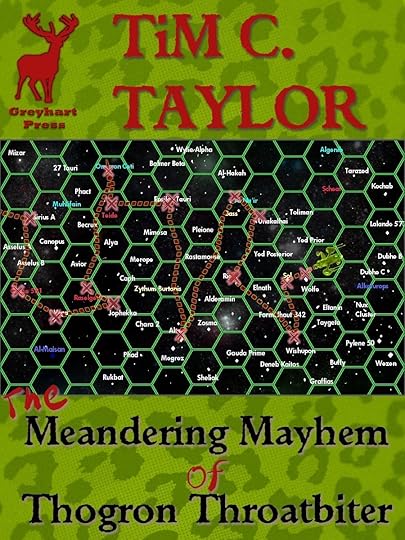 Rather like Henry the Green Engine, my short story The Meandering Mayhem of Thogron Throatbiter has been given a fresh coat of green paint and new stripes. Leopard stripes in my case (okay, splotches really).
Rather like Henry the Green Engine, my short story The Meandering Mayhem of Thogron Throatbiter has been given a fresh coat of green paint and new stripes. Leopard stripes in my case (okay, splotches really).
If you click on the image, you can see it at its proper size. See if you can tell which names on the star map are real, and which are fake…
I think the story of Henry and the tunnel is my dad's favourite Railway Story. He'll be reading this; so this, Dad, is the line you remember and still quote decades after you stopped reading us bedtime stories:
"Once an engine attatched to a train, was afraid of a few drops of rain, it went into a tunnel, and squeaked through it's funnel, and wouldn't come out again!"
I was interviewed about this story a few months ago. I've copied a transcript below…
1. Hi Tim. Can you describe your short novel, The Meandering Mayhem of Thogron Throatbiter to me?
'Meandering Mayhem' is set in an alien star system that has just concluded a centuries-long interplanetary war. With all their opponents finally slaughtered, 'Meandering Mayhem' is the story of what Thogron's people do next. If you can imagine Family Guy doing Conan the Barbarian in space then you kind of get the idea. It was a lot of fun to write. It's about 6,000 words, so a great length to read through in one go over a coffee.
2. I love science fiction and I'm fascinated by the concept of your work; Barbarians discover spaceflight. This sounds as a contradiction, yet this is the point which grabbed my attention as it's a really unique approach and pretty ambitious. So, why Barbarians and why spaceflight?
Two reasons. I had been reading about Alexander the Great and the great military adventure of his Macedonian army. The Macedonians were thought of as barbarians, not least by the Greeks in his army and certainly by the Persians. In the mind of the average Macedonian infantryman, Alexander' army was marching so far into the unknown that it may as well have been marching into space. So in that sense, the 'Meandering Mayhem' is something like the adventures of Alexander's army.
Yet Thogron is not Alexander. I had just written some very dark fiction and I wanted to lighten the mood for my next story. So I picked actor Brian Blessed as my template for the Thogron character. You might not have heard *of* him in Hungary, but you will have *heard him* because Blessed is so unfeasibly loud. He played the king in season 1 of the BBC comedy programme 'Black Adder'. The most watchable and over-the-top TV character I have ever seen. That blood-crazed, wide-eyed, bear of a man roaring: "What? Chiswick! Fresh horses!"… that is my template for Thogron.
Even Thogron, though, has emotions and ambitions. His ship returns for a refit at one point. I remember reading 'The Forever War' by Joe Haldeman as a teenager and struck by the alienation the narrator felt when he returned home. I tried to capture some of that.
3. I always love to know the background process of the development and I love to know what motivates the writer. So, what is the philosophy behind your world, story and character building?
Part of the concept was to consider evolutionary manipulation as an interspecies weapon of war. Basically before the Thogron story starts, there's been a three-way contest between the inhabited planets of this system and Thogron's species won. Thogron's people established bridgeheads in enemy territory where their manipulated biology allowed them to breed at such a ferocious rate that they overwhelm local opposition. I even had spreadsheets working out the numbers. Then, as often happens, I decided that wasn't the best story to tell, although that remains a strong background hinted at but never given the lumpy exposition treatment. A better story, I felt, was to ask this question? After the wars are over, after this species so tuned to war has won, what happens next?
4. What authors and worlds have influenced your writing?
Sci Fi comic 2000AD was a major influence. I started reading from prog1 when I was 7 years old. Years later I realised that the short strips (such as "Tharg's Future Shocks") were mining Golden Age short story ideas from the greats such as Heinlein and Asimov. I'm so glad they did because that hooked me on Sci Fi. Years later I was lucky enough to be published in NewCon Press anthologies alongside two great 2000AD scribes: Alan Moore and Dan Abnett. That was a thrill, I can tell you!
Harry Harrison was a comic artist and he did a version of several Stainless Steel Rat stories for 2000AD. So he was a major influence. Also, David Brin. Alfred Bester, and Stephen Baxter, especially for his Xeelee sequence. And if you are searching for WiFi hotspots in Bromham, England and discover a network named after classic SF author 'Olaf Stapledon', then you know you are near my house!
5. You're based in the United Kingdom, where agents and publishers are pretty common. So, what made you decide to publish independently?
That's a tough question but an important one. I expect you're right that there are more agents and publishers here in the UK than in Hungary, but that probably comes with more competition for their attention too. I am lucky enough to be represented by an agent for my novels. So far I've had a manuscript read by Solaris Books who turned down the story but invited me to show them another novel, which I am writing at present. With short fiction, especially in the novelette and novella size, that's a very different issue (not enough money for agents to represent you) but I think the take up of eReaders will lead to a flowering of fiction at these lengths (I wrote an article about that at Indie Book Lounge: http://tiny.cc/0u4dc ) I'm very excited about that.
So why do the independent publishing for short fiction? I was made redundant in February and was given a Kindle as a leaving gift. That got me thinking, and within a month I had rewritten a some short stories I had sold years before, partly for the fun and partly to broaden my Amazon author page so that when a major anthology I was part of (Further Conflicts) was released, people could read some of the other work I had done. Within a couple of weeks I shifted to publishing other authors' work that I had previously read and deserved a wider airing. So my Greyhart Press rapidly went from a name I invented to publish myself to a genuine independent publisher. This is a very exciting time to be publishing e-books, as I'm sure we all realise.
The Meandering Mayhem of Thogron Throatbiter is available priced 99 cents from Smashwords here: http://www.smashwords.com/books/view/... . Via the magic of the Smashwords premium catalog distribution, it should be available through all the main e-book retailers within a few days.
Thank you for the interview, Istvan. I enjoyed answering your questions.
Tim
[image error]



 [image error]
[image error]
[image error]
[image error]

October 20, 2011
Guest Post: Laura Yirak on Scottish vampires & Scooby-Doo
Today I've a transatlantic interview with Laura Yirak, who comes originally from Scotland.
I'm having to type this one-handed due to an injury, so I'll get straight into the questions without waffle (do I hear a hooray?)
Laura, thanks for agreeing to be interviewed. Your novel Delivered To Eternity features Alesta the Vampire; what made you choose a vampire for a main character?
To put it simply — I love vampires! I think they're HOT! LOL. Alesta, she's one of a kind!
Hot, eh? The first vampire film I ever saw was Nosferatu (1922), full-on scary and no messing. Since then, vamps went cool with Interview with a Vampire, and then went hot teenage romance with Buffy & Angel, and their hellspawn. In this huge universe of different types of vampire, where does Alesta fit in?
Alesta — the name means, 'Savior of Mankind.' She is a traditional vampire in the sense of a vampire and does not sparkle or go out at daytime. I wanted to bring her back to her roots, but she is human-friendly. She did not pick her vamp life and is almost in denial about it. She struggles with this through the storyline.
[image error] The cover blurb for Delivered To Eternity mentions humour. Is this laugh-out-loud comedy or more dark irony? Talking of humour, what makes you laugh?
The humor is all Scottish, maybe a little dark and dry and times. I mix it up.
What makes me laugh? My father — everything he says. I don't know where he comes up with most of it!
Ever since Greene King (an English regional brewer/ pub-operator) bought Belhaven Brewery, I can often get a pint of genuine Scottish 'heavy' in my pub, despite living in sassenach England. Other than to feed, where does Alesta go for a drink, and what is her favourite tipple?
Alesta owns Mc Kenzie Manor House. She drinks there, but what? I won't spoil that  Her favorite though, is anything RED—
Her favorite though, is anything RED—
I'm sure you mean red wine, a fine choice J Talking of Scotland, I recently watched the animated film, Scooby-Doo and the Loch Ness Monster. My son loved it, but I worry that it's only cemented the idea that Scotland consists of kilts, Nessie, highland games, and bagpipes. If it wasn't a children's film it would have mentioned whisky too (but never whiskey!). How many of these classic Scottish conventions does Delivered To Eternity employ? Is there something authentically Scottish in your novel that might surprise readers educated by Scooby-Doo?
HAHA —My children just watched that as well and yes I do employ kilts, but to make my story more authentic than that, my characters all have a Scottish brogue, drink tea most of the day and I have set the scene to make one feel as though they are really there. It's all in the details. My Scottish readers have been very pleased as far as they have told me.
You were a poet before you were a published novelist. Do you think your experience in crafting poetry influenced the way you wrote Delivered To Eternity? How about the other way around? Will your experience in writing the novel influence your poetry?
Crafting poetry is a little more intense for me as far as writing goes. D2E came out in a simple flow of words, but my poetry is more dramatic, passionate and dark. I bounce back and forth between the two and use them as my breaks from the other.
The two are very separate for me. My neurons fire differently. I do have a poetry book coming out next year, titled — The Melancholic. I have posted a sample on my blog 
Are there more Alesta stories to be told? What is your next project?
I have requests coming in to write the sequel to D2E and I will at some point. My next big book due out is a psycho-thriller set on the Washington coast and I have another children's book due out in December or January. It is being illustrated now.
Thank you Tim for the great questions!
Thanks, Laura, for answering them.

Laura Yirak
Learn more about Laura at her website.
Delivered to Eternity is available from amazon.com | amazon.co.uk








October 15, 2011
Why we're going to be reading more novellas
I am falling in love with novellas. It's that Kindle thing again, making them much more commercially feasible. There's an excellent article on this, written by a eminent gentleman (well, me actually) here.




 [image error]
[image error]


Why I chose Elstow as the location for my debut novel
I wrote a guest post about this for Angela White's dark fantasy blog. Not just my novel, Elstow, and John Bunyan, but hopefully it might spark ideas for writers casting about for a location. Oh, and it features De Koninck too. I've more to add but I'm typing this one-fingered as my doctor has told me not to type. More about Elstow when my arm is better…
[image error] [image error]

 [image error]
[image error]
[image error]
[image error]
 [image error]
[image error]
October 13, 2011
Would you believe it? I'm number #1
 When I first began to be published through online retailers, I had a brief addiction to checking sales figures and chart rankings. I soon gave that up as I'm too busy doing more important things, such as writing. Earlier in the week I was talking with Ian Whates from NewCon Press, about the problems he was facing getting my short story, Welcome Home, Janissary, into the Smashwords Premium Catalog. There's no problem with the words or formatting; the problem is that the author name didn't match throughout their systems. We might have to produce a new cover.
When I first began to be published through online retailers, I had a brief addiction to checking sales figures and chart rankings. I soon gave that up as I'm too busy doing more important things, such as writing. Earlier in the week I was talking with Ian Whates from NewCon Press, about the problems he was facing getting my short story, Welcome Home, Janissary, into the Smashwords Premium Catalog. There's no problem with the words or formatting; the problem is that the author name didn't match throughout their systems. We might have to produce a new cover.  Not only is that annoying but it is the reason the book is still not available from retailers such as iTunes and Barnes & Noble.
Not only is that annoying but it is the reason the book is still not available from retailers such as iTunes and Barnes & Noble.
Thinking about that story prompted me today to check the rankings for Welcome Home, Janissary on Smashwords. I was astounded to see that it is the most downloaded short story in the military SF category. I'm number 1! Thank you to everyone who's downloaded, and I hope you enjoyed it. It's also reassuring because I have started writing a series of military SF novels based on the same setting.
Incongruously, being #1 made me think back to the 1980 Olympic Games, which I remember listening to on the radio on a family camping holiday. Great Britain had a very strong duo of male middle-distance runners – Steve Ovett and Sebastian Coe — who were expected to vie for gold medal at every event. After Coe had surprisingly only managed silver in the 800m, I remember asking my dad whether he would rather win five silver medals or a single gold. He replied that he would rather win one gold than a dozen silvers, because gold meant you were the best in the world; nothing can top that.
And that's how I feel now that I'm #1. There are only 80 other stories in that category at Smashwords. I've had other books published that have been downloaded thousands more times. Even on Smashwords, I have another story, called Future Speculation, which has been downloaded far more often, but in its category of general science fiction short stories, it is only the 4th most downloaded book.
I know which I prefer: to be #1!








October 6, 2011
Guest interview: Jean Marie Bauhaus
Today I'm interviewing author Jean Marie Bauhaus, who lives in Tulsa, Oklahoma with an impressive mix of livestock, including a husband.
I'd like to kick off by asking a few questions about your novel, Restless Spirits. Can you tell us what it's about?
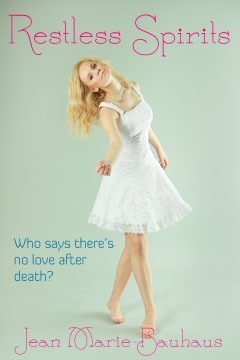 Sure! Restless Spirits is about a paranormal investigator, Veronica ″Ron″ Wilson, who gets killed in the line of duty; but after she herself becomes a ghost, trapped in the house where she died, she realizes that the mystery has just begun. She and several other ghosts are being held prisoner in the house by the same sadistic spirit that killed them. Their captor likes to entertain itself by torturing its fellow ghosts, and as if that isn′t bad enough, it appears to have the ability to kill ghosts, devouring the poor souls for whom it no longer has any use. Ron′s only hope is to convince the other terrified ghosts to rally together to find a way to defeat the evil spirit so they can move on to their final rest. But Ron′s not in any hurry to get there once she discovers that there′s still a lot of living to do after death.
Sure! Restless Spirits is about a paranormal investigator, Veronica ″Ron″ Wilson, who gets killed in the line of duty; but after she herself becomes a ghost, trapped in the house where she died, she realizes that the mystery has just begun. She and several other ghosts are being held prisoner in the house by the same sadistic spirit that killed them. Their captor likes to entertain itself by torturing its fellow ghosts, and as if that isn′t bad enough, it appears to have the ability to kill ghosts, devouring the poor souls for whom it no longer has any use. Ron′s only hope is to convince the other terrified ghosts to rally together to find a way to defeat the evil spirit so they can move on to their final rest. But Ron′s not in any hurry to get there once she discovers that there′s still a lot of living to do after death.
On the telly, ghosts are often beautiful people who happen to be dead… and walk through walls. Sometimes, though, ghouls are gruesome things that give you nightmares just to see them. How scary are your ghosts?
I have a mix of the two types you mentioned, and some that go back and forth. For the most part, the ghosts in Restless Spirits are just regular people who are stuck in limbo, but they have to contend with some pretty scary spirits.
Sounds intriguing. Tell us a little more about your main character in Restless Spirits. What are her quirks?
In life, she was a novelist who moonlighted as a ghost hunter alongside her medium sister, which is pretty quirky in and of itself. She had a bit of a rocky childhood that left her fiercely protective of her sister, and also determined not to let anything — not even death — stand in the way of accomplishing her goals.
Ron seems quite a force of nature from that description. What about you, though? Authors cannot help but draw from their own experiences when crafting characters. Are you like your character, Ron?
Ron is a writer with a very active imagination, and I think there's more of my own voice in her than in most of my other characters; but other than that, she and I don't have a lot in common.
Readers are sometimes astounded to realise that authors are human too. Apparently. Tell us something about your life that doesn't involve writing or a computer. What non-writing event have you got coming up that excites you?
I'm big into knitting and crochet, and I just opened an Etsy shop, Marzipan Pie, to help finance my yarn addiction. Otherwise, I'm getting psyched for my favorite holiday, Halloween, and gearing up for the rest of the holiday season.
As a reader, what books have you read in the past couple of years that you have mentally tagged with 'will definitely read again'?
I'm currently re-reading George R. R. Martin's A Song of Ice and Fire series, which I feel a need to re-read every time he releases a new book in the series just to refresh my memory on what's going on. I try to re-read Coraline and The Graveyard Book, both by Neil Gaiman, every October, and I also like to pull his Neverwhere out and read it again from time to time. And I'm thinking about tackling a re-read of the Harry Potter series for next year. Jonathan Strange & Mr. Norrel by Susanna Clarke is a book I keep planning to re-read, but I haven't gotten around to it yet.
Authors can't afford to waffle on their sales pages, but sometimes have little anecdotes and trivia about their books that they'd love to pass on if they only could. Now's your chance! Have you got any interesting titbits about any of your books that you'd like to share?
With National Novel Writing Month right around the corner, I should mention that Restless Spirits began as my 2007 NaNoWriMo project. I winged it — that is, I wrote without an outline or a preconceived plot — and that was the first year I "won" NaNoWriMo. Of course, the book went through significant revisions between then and the version I ended up publishing, but it taught me the value of powering through a discovery draft instead of meticulously planning and plotting every step.
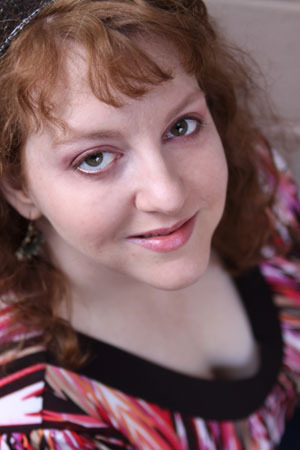
Jean Marie
That's interesting. I've been posting recently about planning versus 'discovery drafts'. That's a topic that will run and run — just like it does in the software development world.
Thanks for taking the time to answer my questions and good luck with NaNoWriMo (if you haven't a clue what I'm talking about, check out the NaNoWriMo site. Better still, sign up!)
You can find out more about Jean at her website: http://www.jeanmariebauhaus.com/











